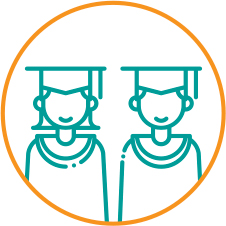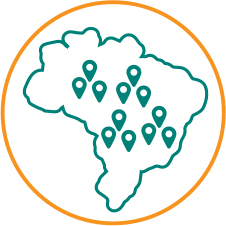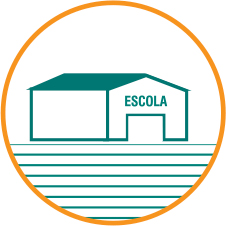Education and awareness

T
he 2022 edition of the Clean Field Environmental Educational Program (PEA) observed significant increases in the number of participating cities (+ 28%), schools (+ 24%), classrooms (+ 87%) and students (+ 25%). Besides the covid-19 pandemic stabilization and the return to in-school classes, with the school calendar back to normal, this growth reflects the efforts of the central station managers, who have worked to include schools from other cities in the central stations' area of influence.
The program continued to offer its e-learning course "Environmental Education: pedagogical theory and practice in solid waste management” to teachers throughout Brazil and not just to those formally participating in the PEA in 2022.
The PEA Connection was also created, a work group counting on ten teachers from different regions across the country, who periodically meet and offer feedback on the program syllabus and activities and also on student response, which helps inpEV improve the pedagogical proposal for forthcoming cycles.
CONTRIBUTION TO THE SDGS
Upholding social-environmental responsibility as one of its values, in 2022 inpEV conducted a self-assessment using the SDG Action Manager platform, a tool developed by the Global Compact and B Lab to measure how its actions influence the achievement of the 17 Sustainable Development Goals (SDGs).
The Institute reached 64.9% overall points, a result above that achieved by the agricultural and livestock sector, by Brazil and by companies of similar size.
3,519 enrollments in the e-learning course covering the Campo Limpo System in 2022.
PEA 2022

243,912 students impacted from 4th and 5th grades of Elementary School.

312 participating cities, 2,620 schools and 14,912 classrooms.

254 educators concluded the
e-learning course.

+ 21,300 accesses to the PEA site, a 49% increase compared to 2021.
DNCL promotes a unique environmental action
The National Clean Field Day (DNCL) counted on a unique initiative in 2022, which, by building upon the System capillarity, reinforced inpEV's commitment towards preserving the environment.
With the DNCL Sustainability, 95 central stations were mobilized to collect tree seedlings from the community and identify locations, such as schools, where they could be planted. Exceeding the initial expectations, 150,000 seedlings were donated, which were planted until the month of December. In 20 years, these trees have the potential of capturing more than 20,000 tons of CO2 from the atmosphere.
Back to the in-school format, 11 cities held official ceremonies on August 18. The events in Rio Verde (GO) and in the São Paulo capital were broadcast live via inpEV's YouTube channel and the Terra Viva television channel.
32,800 participants
in 369 actions of the 2022 DNCL edition.
95 central stations and 12 outposts,
in more than 100 cities, in 19 Brazilian states, participated in this celebration.
218 acknowledged farmers.

SOCIAL NETWORKS
The contents communicated by inpEV impacted millions of people:
Facebook:
6.8 million.
Instagram:
7.3 million.
YouTube:
1.5 million.
LinkedIn:
103,000.